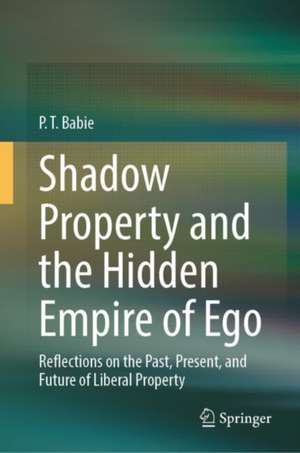Shadow Property and the Hidden Empire of Ego: Reflections on the Past, Present, and Future of Liberal Property
Autor P. T. Babieen Limba Engleză Hardback – 16 sep 2024
Preț: 890.85 lei
Preț vechi: 1086.40 lei
-18% Nou
Puncte Express: 1336
Preț estimativ în valută:
170.49€ • 176.12$ • 141.89£
170.49€ • 176.12$ • 141.89£
Carte tipărită la comandă
Livrare economică 26 martie-09 aprilie
Preluare comenzi: 021 569.72.76
Specificații
ISBN-13: 9789819740130
ISBN-10: 9819740134
Pagini: 160
Ilustrații: Approx. 160 p.
Dimensiuni: 155 x 235 mm
Greutate: 0.44 kg
Ediția:2024
Editura: Springer Nature Singapore
Colecția Springer
Locul publicării:Singapore, Singapore
ISBN-10: 9819740134
Pagini: 160
Ilustrații: Approx. 160 p.
Dimensiuni: 155 x 235 mm
Greutate: 0.44 kg
Ediția:2024
Editura: Springer Nature Singapore
Colecția Springer
Locul publicării:Singapore, Singapore
Cuprins
Introduction Shadow Property and the Hidden Empire of Ego.-Law.- Private Property.-Ego.- Unjustifiable Law.- Reflections on Obligation.
Notă biografică
P. T. Babie is Bonython Chair in Law and Professor of Law and Associate Dean of Law (International), Adelaide Law School, The University of Adelaide. He is a Barrister and Solicitor of the Court of King’s Bench of Alberta (Canada) and an Associate Member of the Law Society of South Australia. His primary research interests include private law theory property law, and property theory. He has published and spoken extensively in these fields and he teaches property law, property theory, water law, and Roman law. His recent works include Léon Duguit and the Social Obligation Norm of Property: A Translation and Global Exploration (Springer, 2019) and Religion Matters: The Contemporary Relevance of Religion (Springer, 2020).
Textul de pe ultima copertă
This book explores the nature of liberal property in the twenty-first century. It contains three parts. The first examines how we have arrived at the liberal concept of property—what many scholars call the 'bundle of rights' metaphor of property. This part argues that the liberal conception embodied in the bundle of rights metaphor is really a way of masking or hiding what property really is: an exercise of ego about the way goods and resources are used. Or, put another way, it enshrines the ability to suit personal preferences about the way things are used, rather than what might better serve the common good. The second part provides an important modern critique of the bundle of rights metaphor—that, in addition to being a collection of rights, property is also about social relations that exist between people. Through these social relations, which are contained in law, any decision that a person makes about how to use a good or resource necessarily carries implications for others. While those effects can be both positive and negative, we are much more familiar with the latter, including most of the global challenges we face today—climate change, extreme weather, global hunger, and global poverty. Taking those global challenges as its focus, the final part of the book suggests possible futures of property in which it is reconceived in ways that reduce the potential for negative impacts on others.
Caracteristici
Presents a comprehensive statement to the theory of property Offers a critique of property that is sympathetic to the dominant liberal theory Interrogates the role of property in contemporary global challenges, including climate change and global hunger
